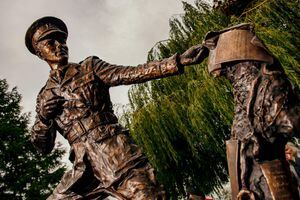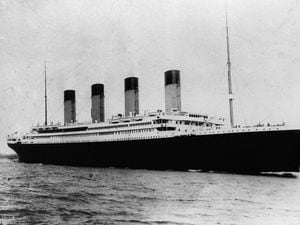Peter Rhodes on hoping for a baby girl, finding comfort in an old lie and the Irish Question - what is it?
The brutal truth

PRINCE Harry apparently let slip that he hopes the forthcoming royal baby is a little girl. I can understand that. His wife Meghan is 37 which means they may become parents to an only child. And if you're only going to have one, let it be a girl. They tend to be more interesting than boys and, as a rule, are less trouble.
A STATUE has been erected in Oswestry to Wilfred Owen, a son of the town and one of our best-loved war poets. Inevitably, with the centenary of the November 11, 1918, Armistice approaching, the Latin proverb which inspired his most famous poem has been much repeated: "Dulce et decorum est pro patria mori." It can be translated in a number of ways but the essence is "It is sweet and fitting to die for one's country." In his poem, Owen calls it "the old lie." The reality was the ghastly death he described of a soldier drowning in a sea of chlorine gas.
AND yet, long after Owen's poem was published and the British public knew the truth about the horrors of modern warfare, they were still desperate to believe it had been a noble fight. When my home village in Yorkshire raised a memorial in the 1920s to the lads who had served in the war, the locals chose the same Latin inscription as Owen. To modern eyes it is shocking to see "Dulce et decorum est" on a war memorial but I think I can understand it. The brutal truth cannot, and should not, be denied. But if folk can find comfort in an old lie, why shouldn't they?
I WONDER how many of today's Brexit experts, pontificating about the Northern Ireland border, heard a fascinating recent edition of Analysis (Radio 4). If they didn't, they certainly should. At the heart of the backstop fury is Whitehall's absolute determination that Northern Ireland must not be treated any differently from the rest of the UK. But it was never meant to be so. From the 1921 Treaty onwards, it was assumed, both in London and Dublin, that within a few years the North would join the Republic. That prospect is surely closer than ever. The age of fervent "No Surrender!" unionism is passing; the age of a hard-line Catholic South has already passed.
ANALYSIS introduced us to young people from Unionist backgrounds who are quite prepared to join with the South and content to be a Protestant minority in a united Ireland. After all the blood, sweat and tears of negotiating a special deal for the North, don't be surprised if the North shrugs its shoulders and decides to join the South.
AS the Ulster backstop nonsense rattles on, one line from that gloriously silly historical spoof, 1066 And All That bears repeating: "Gladstone .. spent his declining years trying to guess the answer to the Irish Question; unfortunately, whenever he was getting warm, the Irish secretly changed the Question."





